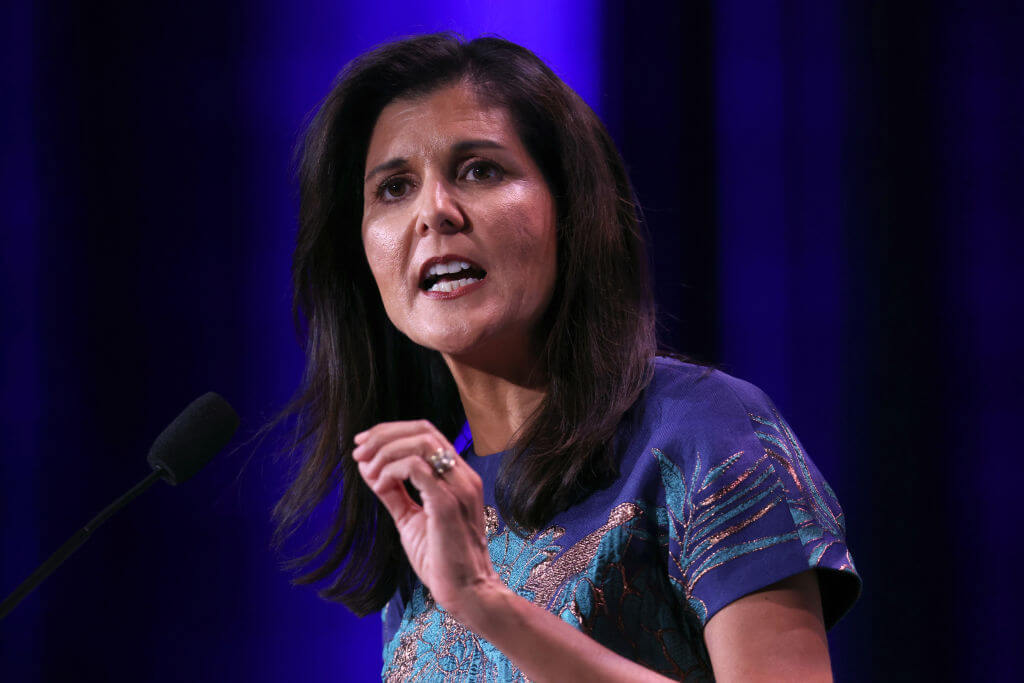Ready to run for president, Nikki Haley is a star in the pro-Israel community
Haley is the first candidate to challenge her former boss, Donald Trump

Former U.N. Ambassador Nikki Haley on Nov. 19, 2022. Photo by Scott Olson/Getty Images
Reports from South Carolina indicate that Gov. Nikki Haley will jump into the presidential race later this month. She told backers to expect a “special announcement” on Feb. 15.
Like many other Republicans considering a bid — including former Vice President Mike Pence, former Secretary of State Mike Pompeo, Florida Gov. Ron DeSantis, and John Bolton, former U.S. national security adviser — Haley has established herself as a strong ally of Israel. That matters to many Republican voters, including Christian evangelicals and Republican Jewish megadonors.
Her announcement, first reported by the Charleston Post and Courier, will enable her to build a donor base and a campaign infrastructure in South Carolina, one of the early primary states. It may also provoke former President Donald Trump, who appointed her ambassador to the U.N., as well as other Republicans still contemplating a bid. Trump and Steve Laffey, the former mayor of Cranston, Rhodes Island, are the only Republicans so far to have declared their intention to run.
Here’s what you need to know about Haley’s relationship with American Jews and her views on Israel:
The United Nations as launchpad
Haley became a source of pride for the pro-Israel community during her short tenure as U.S. ambassador to the U.N. in the first half of the Trump administration.
There she spoke out forcefully in defense of Israel in the international body, where Israel faces many antagonists, and forged close ties with the then-Israeli ambassador, Danny Danon, in leading the fight against anti-Israel resolutions.
During her time in office, from January 2017 to December 2018, Haley led the effort to stop U.S. funding for the United Nations Relief Works Agency (UNRWA), which serves Palestinian refugees, and blocked the appointment of former Palestinian prime minister Salam Fayyad as a U.N. envoy to Libya. She spearheaded the U.S. withdrawal from the United Nations Human Rights Council, a move that was welcomed in Israel given the council’s frequent criticism of the Jewish state. After 128 nations voted to reject Trump’s recognition of Jerusalem as Israel’s capital, Haley hosted a reception for the countries that voted against the resolution or abstained.
Those moves made her a star at the American Israel Public Affairs Committee’s annual policy conferences. Her famous applause lines include, “The days of Israel bashing are over,” “There’s a new sheriff in town,” and “I wear heels, but it’s not a fashion statement. It’s because if I see something wrong, I’m gonna kick ’em every single time.”
Haley was also on the close-knit team that worked on Trump’s Middle East peace plan.
Trump’s whisperer on Iran
Haley was the Trump administration’s most vocal public supporter for the U.S. withdrawal from the 2015 nuclear deal with Iran. Earlier on in the administration, Haley battled Trump’s national security team, former Defense Secretary James Mattis and Secretary of State Rex Tillerson, who advocated for a different tack: certifying that Iran was complying with the terms of the agreement, which was negotiated by the Obama administration.

Haley reportedly offered to lead the case for decertification, traveling abroad and pressing officials about Iranian compliance. That boosted her standing with Trump, who was critical of the deal.
In 2021, Haley called Iran “the sugar daddy of Hamas” in the Gaza Strip. And later that year, speaking at the Republican Jewish Coalition’s annual leadership meeting, Haley criticized AIPAC for its ties to some Democratic politicians who strongly supported the Iran nuclear deal.
Years in the making
Just two years into her term as ambassador, Haley announced she would leave office to spend more time with her family. She was initially rumored to be Trump’s choice as a running mate in 2020 after declaring she wouldn’t challenge him in a primary.
Mike Pompeo, her former colleague, who is also teasing a White House bid, accused Haley in his recently released memoir of plotting Pence’s removal so that she could become vice president. Pompeo deemed her resignation irresponsible. “She has described her role as going toe-to-toe with tyrants,” Pompeo writes. “If so, then why would she quit such an important job at such an important time?”
But for many Republicans, Haley was seen as the future of the party after Trump’s presumed departure. Though Jews, historically, vote overwhelmingly for Democrats, some have opined that she could be the first Republican presidential candidate to win a majority of the Jewish vote.
Jewish support
Haley is currently polling at 3% among Republican primary voters. But a focus on foreign policy and building on her strong donor base could make her a stronger contender.
Haley’s super PAC, Stand for America, raised more than $17 million in the last election cycle and has $2 million cash on hand. Prominent Jewish donors who contributed to her PAC include Miriam Adelson and her late husband Sheldon Adelson; Paul Singer, a veteran hedge fund manager; Bernie Marcus, co-founder of Home Depot; Daniel Loeb, a New York-based hedge fund manager; Jay Lefkowitz, an attorney and former adviser to President George W. Bush; Ira Rennert, a real estate investor; Norman Braman, a Florida auto dealer who supported Jeb Bush and Marco Rubio in the 2016 primary; Samuel Zell, a businessman and philanthropist; and Ronald Lauder, president of the World Jewish Congress.
Charles Kushner, father of Jared Kushner, Trump’s son-in-law, hosted a fundraiser for Haley last year.
Since the death of Sheldon Adelson in 2021, the Republican kingmaker in past election cycles, Miriam Adelson has kept a low profile and pledged to stay neutral in the upcoming Republican presidential primary.
Haley’s inner circle
Haley’s longtime advisor, Jon Lerner, who is Jewish, is expected to take a leading role in her campaign.
Lerner was a senior aide to Haley when she was governor of South Carolina and became her deputy at the U.N. A Minnesota native, Lerner considered the late Republican campaign strategist Arthur Finkelstein — who played a critical role in the rise of Benjamin Netanyahu in 1996 — a mentor. In 2013, Facebook founder Mark Zuckerberg tapped him to help run a political advocacy group that lobbied for legislative reform on immigration and education. Throughout the 2016 presidential primary, Lerner played a key role in the “Never Trump” camp. In the past, he has worked with Republican Sens. Marco Rubio of Florida and Tim Scott of South Carolina.
Haley recently hired Nachama Soloveichik, a conservative political consultant, to lead her communications team. She is a scion of the distinguished Soloveichik Orthodox rabbinical lineage, and sister of Rabbi Meir Soloveichik.
This post was updated on Feb. 3 to include the addition of Steve Laffey, who became the first candidate to challenge Trump for the Republican nomination in 2024.




















